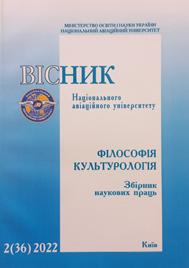THE CIVILIZATIONAL ASPECT OF THE CONCEPT OF SUSTAINABLE DEVELOPMENT IN A GLOBALIZED WORLD
DOI:
https://doi.org/10.18372/2412-2157.36.16981Keywords:
the concept of sustainable development, civilizational aspects, globalized world, laws of dialectics, world-system, societyAbstract
Introduction. The world we live in is changing so rapidly that even scientists do not have time to comprehend the changes and
determine the possibilities for further development. Trying to overcome the contradictions of the socio-cultural heritage of the modern
era, humanity seeks to move forward through controlled sustainable development. The trends that began in the 20th century are
maturing and operating in new conditions, against the backdrop of new global challenges, which largely determine the nature and result
of the implementation of the concept of sustainable development. The aim and tasks are the philosophical analysis of the civilizational
dimension of the implementation of the concept of sustainable development as a tool for artificial management of the globalized world.
Research methodology is dialectical, sociocultural, systemic, and interdisciplinary methodological approaches, principles of
hermeneutics, and historicism. Research results. There are different civilizational theories that substantiate the vector of interaction
between different countries and the world community as a whole in order to overcome the global problems of mankind in different ways.
From the standpoint of the dialectical law of the mutual transition of quantitative and qualitative changes, the chosen strategy for
overcoming global threats does not work. A qualitative leap that characterizes development has not taken place and, based on existing
trends, it will not happen in the future. Internal contradictions are in artificial stasis. The dogmatization of goals in the adopted Concept
makes it impossible to correct them in accordance with the challenges of the present. In turn, this state contradicts the evolutionary path
of development. Discussion. The most appropriate structure of civilizational development in a globalized world is the concept of "worldsystem
analysis" proposed by I. Wallerstein. Global patterns and trends are increasingly active on the planet, the nature of which is
determined primarily by the interests and capabilities of a small group of the most powerful states, international financial institutions, and
transnational corporations (Pavlenko). Conclusions. The concept of sustainable development requires detailed development and
philosophical reflection of new development strategies based on objective principles and laws of dialectics.
References
Titenberg T. Environmental and Natural Resource Economics. New York: Harper College publ., 1996. 410 p.
Валлерстайн И. Анализ мировых систем и ситуация в современном мире / пер. с англ. П. М. Кудюкина. СПб. : Издатальство «Университетская книга», 2001. 416 с.
Ватченко О. Б., Ільченко В. М. Виникнення та аналіз поняття «сталий розвиток». Вісник Дніпропетровської державної фінансової академії: Зб. наук. пр. «Економічні науки». Дніпропетровськ. 2011. № 1.С. 64-68.
Гелд Д., Мак Грю Е., Голдблатт Д., Перратон Дж. Глобальні трансформації. Політика, економіка, культура. К. : Фенікс, 2003. – С. 24-33.
Голубець М. А. Геосоціосистемологія теоретична основа еколого-суспільно-економічного прогресу. Вісн. НАН України. 2014. № 6. С. 31-40.
Донелла Х. Медоуз, Деннис Л. Медоуз, Рэндерс Й., Беренс В. Пределы роста / пер. с англ. М. : Издательство МГУ, 1991.
с.
Дротянко Л. Г. Екологічна криза техногенної цивілізації: ризики ХХІ століття. Вісник Національного Авіаційного Університету. Серія: Філософія. Культурологія. № 34 (2). К. : НАУ, 2021. С. 9-14.
Дротянко Л. Г. Цифровий вимір сучасного етапу цивілізаційного розвитку соціуму. Вісник Національного Авіаційного Університету. Серія: Філософія. Культурологія. № 33(1). К. : НАУ, 2021. С. 16-21.
Економічна енциклопедія. Т 3. К. : «Академія», 2002. 952 с.
Клешня Г. М. Концепція сталого розвитку як передумова розвитку соціуму у глобалізованому світі. Вісник Національного
Авіаційного Університету. Серія: Філософія. Культурологія. № 30(2). К. : НАУ, 2019. С. 138-143.
Матюхіна, О. А.; Павлюк, Н. Ю. Зміна клімату як глобальна проблема сучасності: виклики та шляхи вирішення (філософський аспект). Вісник Національного авіаційного університету. Філософія. Культурологія. (2) К. : НАУ, 2017. С. 89-93.
Мельник Л. Г. Основи стійкого розвитку (Текст) : навч. посіб./За ред. Л.Г. Мельника. Суми : Університетська книга, 2005. 654 с.
Окорокова В. В. Антропологічний фактор віртуалізації суспільства: всесвітньо-історичний підхід. Вчені записки Таврійського національного університету імені В. І. Вернадського. Серія: Історичні науки. Т. 31 (70). № 2. Київ : Гельветика, 2020. С. 51-56.
Орденов С. С. Соціальна лімінальність як стаціонарний стан транзитивних суспільств глобалізованого світу. Вісник Національного Авіаційного Університету. Серія: Філософія. Культурологія. № 29 (1). К. : НАУ, 2019. С. 55-66.
Павленко Ю. Глобалізація та цивілізаційні зрушення сьогодення. Міжнародна економічна політика. № 1 (2). 2005. С. 100–116.
Філософський енциклопедичний словник / редкол.: В. І. Шинкарук та ін. К. : Абрис, 2002. 742 с.
Фукуяма Ф. Сильное государство: Управление и мировой порядок в ХХІ веке/пер. с англ. Москва : Аст; Хранитель, 2006. 200 с.
Хантингтон С. Столкновение цивилизаций? Полис. № 3. 1994.
Шоріна Т. Г. Морально-етичні колізії ідеї солідарності у боротьбі глобальної спільноти з пандемією COVID-19. Вісник Національного Авіаційного Університету. Серія: Філософія. Культурологія, 32(2).


